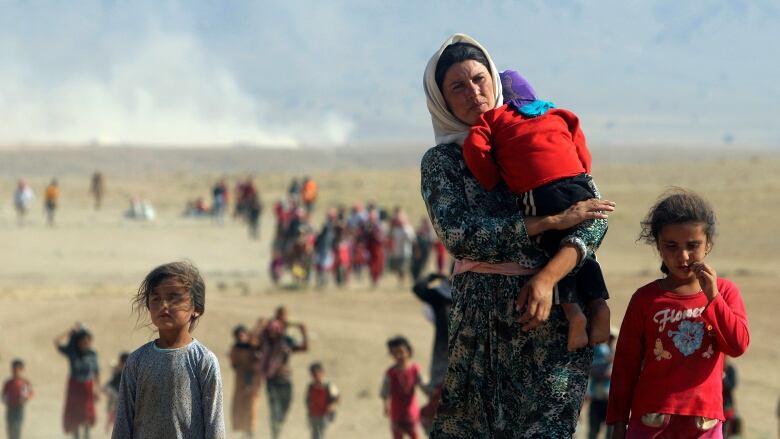Refugee Yazidis fleeing ISIS in Iraq, making London home
More than a quarter of Yazidi refugees brought to Canada have settled in London

Janey Halo and Ramzya Issa have known each other for just over five years, but they've been through a lifetime of experiences together.
Halo, 20, and Issa, 30, first met at a party in 2011, in northern Iraq.
Six years later, they're newly arrived government-assisted refugees in London, missing family and lost loved ones.
"Before the situation with ISIS took over our communities and towns, we had a family life, a basic life but a happy life. They wiped everything out and it was a disaster," Issa told CBC's Afternoon Drive through an interpreter.
The two women are part of a group of 1,200 Yazidi refugees persecuted by ISIS that the federal government pledged to bring to Canada earlier this year.
- Newly arrived Yazidis eager to build better future in Canada
- Yazidi groups say they're left in the dark about Canada's resettlement plans
- Liberals unveil resettlement plan for 1,200 Yazidi refugees
More than a quarter have settled in London, which already has a tight-knit Yazidi community. It formed in the early 1980s after many people fled the dictatorship of Saddam Hussein.
Another family arrives Monday
London is one of four major Canadian settlement centres for the ethnic minority group. Winnipeg, Toronto and Montreal are the other three.
Both Halo and Issa arrived in London on May 29, fleeing first their home city of Dohuk in northern Iraq for a refugee camp but leaving behind many questions about the fate of family members who were unable to escape.
"The ones we know who were killed, we're looking through mass graves and we can't even find the bones to bury them. It's hard," said Halo.
Neither women wanted her picture used, fearing for the safety of their family members still in Iraq.
'Victims of so many genocides'
In May and June, London's Cross Cultural Learners Centre helped settle 104 ISIS survivors, with 77 self-identifying as Yazidi, the others self-identify as Kurdish.
Recently, 31 Yazidis who were originally placed in Toronto moved to London, said Valerian Marochko, the executive director of the Cross Cultural Learners Centre.
"They have a community here in London. It's important for them to be with people who understand their situation, because they've been targeted for so many years, been the victims of so many genocides," Marochko said.
Yazidis are ethnic Kurds who mostly reside in northern Iraq and practice a religion that has elements of Christianity, Islam and Zoroastrianism. Branded as devil worshippers by some Muslims, including ISIS militants, the community has faced persecution for centuries.

For Halo and Issa, Canada means hope for a better future for themselves and their family members.
"We came here seeking safety. There is no future where (we) came from. (We're) here to start fresh," said Issa.
Halo said she hopes she can have a safe future for herself and her children -- but missing family members, many of them likely killed, are not far from her thoughts.
"It's good to be here but we still can never forget the missing family members. We always think of them," said Halo.
Both women want to grow their families and their careers.
'I don't feel alone when she is with me'
Issa has always wanted to go to medical school, and Halo wants to do something in sport, perhaps be a trainer.
She used to watch the Spanish soccer league with her brothers. They've been killed, so that doesn't bring her job anymore, she said.
"Playing sports is good, not just for the body, but for the brain," Halo said.
The two are happy to have reunited in a refugee camp and to have come to Canada together.
"I love Janey so much. I see her as a friend, as a sister. When she is beside me, it's like family is beside me," Issa said. "I don't feel alone when she is with me."